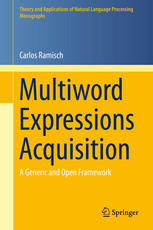

Most ebook files are in PDF format, so you can easily read them using various software such as Foxit Reader or directly on the Google Chrome browser.
Some ebook files are released by publishers in other formats such as .awz, .mobi, .epub, .fb2, etc. You may need to install specific software to read these formats on mobile/PC, such as Calibre.
Please read the tutorial at this link: https://ebookbell.com/faq
We offer FREE conversion to the popular formats you request; however, this may take some time. Therefore, right after payment, please email us, and we will try to provide the service as quickly as possible.
For some exceptional file formats or broken links (if any), please refrain from opening any disputes. Instead, email us first, and we will try to assist within a maximum of 6 hours.
EbookBell Team

4.4
32 reviewsThis book is an excellent introduction to multiword expressions. It provides a unique, comprehensive and up-to-date overview of this exciting topic in computational linguistics. The first part describes the diversity and richness of multiword expressions, including many examples in several languages. These constructions are not only complex and arbitrary, but also much more frequent than one would guess, making them a real nightmare for natural language processing applications.
The second part introduces a new generic framework for automatic acquisition of multiword expressions from texts. Furthermore, it describes the accompanying free software tool, the mwetoolkit, which comes in handy when looking for expressions in texts (regardless of the language). Evaluation is greatly emphasized, underlining the fact that results depend on parameters like corpus size, language, MWE type, etc. The last part contains solid experimental results and evaluates the mwetoolkit, demonstrating its usefulness for computer-assisted lexicography and machine translation.
This is the first book to cover the whole pipeline of multiword expression acquisition in a single volume. It is addresses the needs of students and researchers in computational and theoretical linguistics, cognitive sciences, artificial intelligence and computer science. Its good balance between computational and linguistic views make it the perfect starting point for anyone interested in multiword expressions, language and text processing in general.